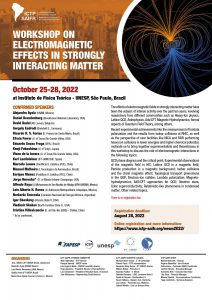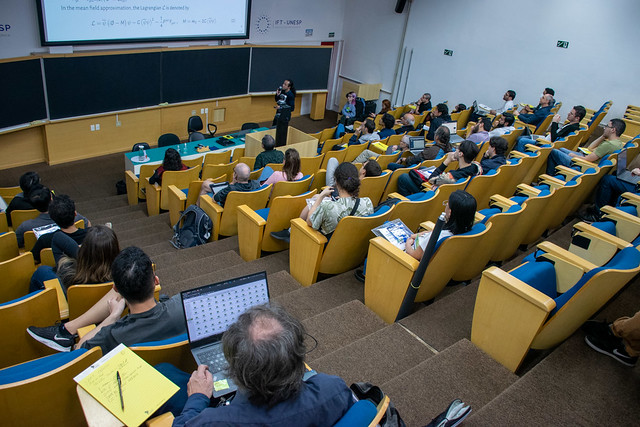Workshop on Electromagnetic Effects in Strongly Interacting Matter

October 25-28, 2022
ICTP-SAIFR, São Paulo, Brazil
Auditorium of IFT-UNESP
Home
The effects of electromagnetic fields in strongly interacting matter have been the subject of intense activity over the past ten years, involving researchers from different communities such as Heavy-Ion physics, Lattice QCD, Astrophysics, Ads/CFT, Magneto-Hydrodynamics, formal aspects of Quantum Field Theory, among others.
Recent experimental achievements like the measurement of lambda polarization and the results from isobar collisions at RHIC, as well as the perspective of new facilities like NICA and FAIR performing heavy ion collisions in lower energies and higher chemical potential, motivate us to bring together experimentalists and theoreticians in this workshop to discuss the role of electromagnetic interactions in the following topics:
– QCD phase diagram and the critical point
– Experimental observations of the magnetic field in HIC
– Lattice QCD in a magnetic field
– Particle production in a magnetic background
– Isobar collisions and the chiral magnetic effect
– Topological transport phenomena in the QGP
– Electron-ion collider
– Lambda polarization
– Magneto-hydrodynamics
– AdS/CFT approaches for QCD
– Neutron stars
– Color superconductivity
– Relativistic-like phenomena in condensed matter
– Other related topics
There is no registration fee.
Organizers:
- Ana J Mizher (IFT-UNESP, Brazil): chairperson
- Alejandro Ayala (UNAM, Mexico)
- Luis Alberto Hernandez (UAM, Mexico)
- Gastão Krein (IFT-UNESP, Brazil)
- Maria Elena Tejeda-Yeomans (Colima University, Mexico)
Speakers
List of abstracts: PDF updated on Oct. 21, 2022
Invited Speakers:
- Alejandro Ayala (UNAM, Mexico): Anisotropic photon emission from gluon fusion and splitting in peripheral heavy-ion collisions with a strong magnetic background
- Cesar A. Bernardes (UFRGS, Brazil): Searches for the chiral magnetic effect and strong electromagnetic fields in heavy ion collisions with the CMS detector at the LHC
- Fabio Braghin (Universidade Federal de Goiás, Brazil): Weak magnetic field corrections to low energy light vector and axial mesons couplings and mixings
- Daniel Brandenburg (Brookhaven National Laboratory, USA): Studying the electromagnetic fields of heavy-ion collisions with photon-mediated processes
- David Dudal (KU Leuven, Belgium): A possible half-integer Quantum Hall Effect: RQED bulk perspective and more
- Gergely Endrodi (Bielefeld University, Germany): QCD matter in strong magnetic and electric fields
- Ricardo R. S. Farias (Universidade Federal de Santa Maria, Brazil): Issues related to regularizing thermo and magnetic contributions within nonrenormalizable theories
- Eduardo Souza Fraga (UFRJ, Brazil): Strange magnetars admixed with fermionic dark matter
- Kenji Fukushima (University of Tokyo, Japan): Chiral anomaly and the interpretation with spacetime dependent electromagnetic fields
- Marcelo Loewe (Pontificia Universidad Católica (PUC), Chile): Electric and magnetic field effects, including temperature, on a scalar self interacting theory λφ 4 theory
- Manuel Malheiro (Instituto Tecnologico da Aeronautica, Brazil): Effects of Strong Electric and Magnetic Fields in Superdense Matter
- Enrique Munoz (Pontificia Universidad Católica (PUC), Chile): Fermion mass and width in QED in a magnetic field
- Alfredo Raya (Universidad Michoacana de San Nicolás de Hidalgo (IFM-UMSNH), Mexico): Aspects of Chiral Symmetry Breaking in RQED
- Luis Alberto H. Rosas (Universidad Autónoma Metropolitana-Iztapalapa, Mexico): Magnetic screening mass for neutral pions
- Norberto Scoccola (Comisión Nacional de Energía Atómica, Argentina): Mesons under strong magnetic field in the NJL model
- Igor Shovkovy (Arizona State University,USA): IFT-Colloquium: Electromagnetic probes of magnetized quark-gluon plasma
- Vladimir Skokov (North Carolina State University, USA)
- Cristian Villavicencio (Universidad del Bio-Bio (UBB) – Chillán, Chile): Finite Energy Sum Rules at finite magnetic fields: advances and perspectives
- Gang Wang (University of California-Los Angeles, USA): Search for the Chiral Magnetic Effect in Heavy-ion Collisions
Contributed Talks:
- Alfonso Ballon-Bayona (Universidade Federal do Rio de Janeiro, Brazil): Magnetising the N = 4 Super Yang-Mills plasma
- Duifje van Egmond (CPHT, Ecole Polytechnique, France ): Signatures of the Yang-Mills deconfinement transition from the gluon two-point correlator
- Jorge Igor Jaber-Urquiza (UNAM, Mexico): Magnetic field effect on Higgs boson production rate through gluon fusion
- Kauan Marquez (Universidade Federal de Santa Catarina, Brazil): Exploring the effects of Delta Baryons in magnetars
- Tulio Eduardo Restrepo (Universidade Federal do Rio de Janeiro, Brazil): QCD pressure at finite temperature and high magnetic fields
- Ashik Ikbal Sheikh (Kent State University, USA): Probing electromagnetic field with charge dependence of directed flow in STAR experiment at RHIC
- William Rafael Tavares (Universidade Federal de Santa Catarina, Brazil): The magnetic field independent regularization applied to light meson masses: the neutral $\rho$ meson case
- Dean Valois (Bielefeld University, Germany): Lattice QCD with an inhomogeneous magnetic background
Posters:
- Maximo Coppola (National Atomic Energy Commission , Argentina): Magnetic field driven enhancement of the weak decay width of charged pions within NJL model
- Rafael Pacheco Cardoso (Universidade Federal de Santa Catarina , Brazil ): Magnetic moment anomaly of quarks: effects on QCD phase diagram
- José Carlos Jiménez (USP , Brazil ): Strange dwarfs and the question of their dynamical stability
- David Montenegro (Joint Institute for Nuclear Research , Russia ): Linear response hydrodynamics of a relativistic dissipative fluid with spin
- Joana Carolina Sodré (UFSC , Brazil): Study of the pole mass of mesons in strong magnetic fields through Ritus method of eigenfunctions
- Nairy Aleximar Villarreal (Universidad Federal do ABC, Brazil): Transport coefficients and quasinormal modes in Einstein-dilaton Holography
- Jorge Castaño Yepes (Pontificia Universidad Católica de Chile): TBA
Registration
Videos and Files
- 09:30 - William Rafael Tavares (Universidade Federal de Santa Catarina, Brazil): The magnetic field independent regularization applied to light meson masses: the neutral $\rho$ meson case
- 10:00 - Norberto Scoccola (Comisión Nacional de Energía Atómica, Argentina): Mesons under strong magnetic field in the NJL model
- 10:50 - Marcelo Loewe (Pontificia Universidad Católica (PUC), Chile): Electric and magnetic field effects, including temperature, on a scalar self interacting theory λφ 4 theory
- 11:20 - Ricardo R. S. Farias (Universidade Federal de Santa Maria, Brazil): Issues related to regularizing thermo and magnetic contributions within nonrenormalizable theories
- 11:50 - José Carlos Jiménez (USP , Brazil): Strange dwarfs and the question of their dynamical stability
- 14:00 - Tulio Eduardo Restrepo (Universidade Federal do Rio de Janeiro, Brazil): QCD pressure at finite temperature and high magnetic fields
- 14:30 - Cristian Villavicencio (Universidad del Bio-Bio (UBB) – Chillán, Chile): Finite Energy Sum Rules at finite magnetic fields: advances and perspectives
- 15:00 - Manuel Malheiro (Instituto Tecnologico da Aeronautica, Brazil): Effects of Strong Electric and Magnetic Fields in Superdense Matter
- 16:00 - Kauan Marquez (Universidade Federal de Santa Catarina, Brazil): Exploring the effects of Delta Baryons in magnetars
- 16:30 - Duifje van Egmond (CPHT, Ecole Polytechnique, France): Signatures of the Yang-Mills deconfinement transition from the gluon two-point correlator
- 09:30 - Alejandro Ayala (UNAM, Mexico): Anisotropic photon emission from gluon fusion and splitting in peripheral heavy-ion collisions with a strong magnetic background
- 10:00 - Cesar A. Bernardes (UFRGS, Brazil): Searches for the chiral magnetic effect and strong electromagnetic fields in heavy ion collisions with the CMS detector at the LHC
-
10:50 - Daniel Brandenburg (Brookhaven National Laboratory, USA):
Studying the electromagnetic fields of heavy-ion collisions with photon-mediated processes
- 11:20 - Gang Wang (University of California-Los Angeles, USA): Search for the Chiral Magnetic Effect in Heavy-ion Collisions
- 11:50 - Ashik Ikbal Sheikh (Kent State University, USA): Probing electromagnetic field with charge dependence of directed flow in STAR experiment at RHIC
- 14:00 - Dr. Igor Shovkovy (Arizona State University): Electromagnetic probes of magnetized quark-gluon plasma
- 09:30 - Alfonso Ballon-Bayona (Universidade Federal do Rio de Janeiro, Brazil): Magnetising the N = 4 Super Yang-Mills plasma
- 10:00 - Luis Alberto H. Rosas (Universidad Autónoma Metropolitana-Iztapalapa, Mexico): Magnetic screening mass for neutral pions
- 10:50 - Gabriel Brandao de Gracia (Unesp-IFT): Statistical interaction for quasi-particles
- 11:20 - Alfredo Raya (Universidad Michoacana de San Nicolás de Hidalgo (IFM-UMSNH), Mexico): Aspects of Chiral Symmetry Breaking in RQED
- 11:50 - David Dudal (KU Leuven, Belgium): A possible half-integer Quantum Hall Effect: RQED bulk perspective and more
- 14:00 - Eduardo Souza Fraga (UFRJ, Brazil): Strange magnetars admixed with fermionic dark matter
- 14:30 - Igor Shovkovy (Arizona State University,USA): Electromagnetic probes of magnetized quark-gluon plasma
- 15:00 - Kenji Fukushima (University of Tokyo, Japan): Chiral anomaly and the interpretation with spacetime dependent electromagnetic fields
- 09:30 - Dean Valois (Bielefeld University, Germany): Lattice QCD with an inhomogeneous magnetic background
- 10:00 - Gergely Endrodi (Bielefeld University, Germany): QCD matter in strong magnetic and electric fields
- 10:50 - Fabio Braghin (Universidade Federal de Goiás, Brazil): Weak magnetic field corrections to low energy light vector and axial mesons couplings and mixings
- 11:20 - Enrique Munoz (Pontificia Universidad Católica (PUC), Chile): Fermion mass and width in QED in a magnetic field
- 11:50 - Jorge Igor Jaber-Urquiza (UNAM, Mexico): Magnetic field effect on Higgs boson production rate through gluon fusion
- 14:00 - Saul Hernandez (Iowa State University): Quarkyonic Matter: Excluded volume model and more
- 14:30 - Alejandro Ayala (UNAM, Mexico): Summary talk
asdasdasd
Photos
Program
Workshop program: PDF updated on October 25, 2022
List of abstracts: PDF updated on Oct. 21, 2022
Additional Information
List of Participants: PDF updated on Oct. 31, 2022
COVID-19: Fully vaccinated brazilians and foreigners are now exempt from presenting proof of a COVID-19 test with a negative or non-detectable result. You are only required to present proof of vaccination, printed or electronically. To enter the IFT-UNESP building, you may be required to show a Covid vaccination certificate.
BOARDING PASS: All participants, whose travel has been provided or will be reimbursed by ICTP-SAIFR, should bring the boarding pass upon registration. The return boarding pass (PDF, if online check-in, scan or picture, if physical) should be sent to secretary@ictp-saifr.org by e-mail.
Poster presentation: Participants who are presenting a poster MUST BRING A BANNER PRINTED. The banner size should be at most 1 m (width) x 1,5 m (length). We do not accept A4 or A3 paper. Click here to see what a banner looks like: http://designplast.ind.br/produtos/detalhe/impressao-digital/banner/119/9
Visa information: Nationals from several countries in Latin America and Europe, Australia, Canada, Japan and USA are exempt from tourist visa. Please check here which nationals need a tourist visa to enter Brazil.
Hotel recommendation: http://www.ictp-saifr.org/hotel-recommendations-2. Participants and Speakers whose accommodation will be provided by the institute will stay at The Universe Flat.
How to reach the Institute: The school will be held at ICTP South American Institute, located at IFT-UNESP, which is across the street from a major bus and subway terminal (Terminal Barra Funda). The address which is closer to the entrance of the IFT-UNESP building is R. Jornalista Aloysio Biondi, 120 – Barra Funda, São Paulo. The easiest way to reach us is by subway or bus, please find instructions here.
Information for 2020 applicants: If you are still interested in participating, please review and update your submission HERE. If you are not able to participate in the school, please cancel your registration HERE.

